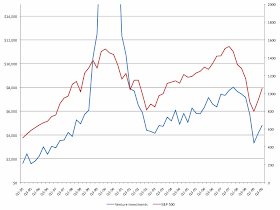
But, to be fair, I also don't believe there will be a time when there is no advertising. In fact, I fear quite the opposite. I fear there will be plenty of advertising, and none of it useful.
An investor in my last company--who, whatever else you might say about him, was quite smart--told me once that the company would be successful in direct proportion to the value it created for the consumer. We thought about this a lot as we built the business, and that was no easy thing, because we were in the lead gen space.
And this is the problem: our incentives were not to create more value for the consumer. The consumer wasn't our customer, the advertiser was. This is the problem for all advertisers.
I think advertising is bad. I also think it's good. I guess, in the end, I think it's the worst possible system, aside from all the rest. Pre-internet, how else could companies let customers know what products were available to them in a reasonably efficient way? Producing a message and distributing it was a scale effort; it was only effective en masse. So the cost of delivering the message had to be borne by the advertiser.
This, though, meant that the consumer had to determine if a given ad could be taken at face value. The elaborate game played between legitimate advertisers, trying to signal quality, and the others, who aped the legitimate advertisers' messages in order to ride on their coat-tails, led ads further and further from actual information-delivering devices*.
This Summer I read The Economics of Attention
In this world the best way to decide which product to buy is to listen to two competing producers argue with each other. Like opposing lawyers in court presenting their case to you, the jury. Or like two politicians putting up TV commercials during election season. Neither of these is an efficient way to come to a rational decision, of course, but what way would be better? Lanham views this result as not only inevitable, but the natural order of things. The scientific mindset, that there is some underlying truth, is to him an anti-Hayekian attempt at top-down control, perpetrated throughout our Western culture, from Plato through Feynman. Against this he says: there is no truth, there is only opinion; let each have their say and you decide who you think is more persuasive.
Call me scientific, but I think that some products are objectively better fits with certain people than others. But I am also a Hayekian, and I don't believe that it's right to tell people what products are right for them. I do believe that we can build tools to help people find products better. Goodman and I can agree on this.
Too many people take advertising as it is for granted, though, rather than seeing today's environment as a bit of a historical anomaly. Look at the chart of ad spend per capita above** (this is in real dollars, btw.) The hockey-stick here, starting in the 1950's, was driven by the emergence of mass media; the increase in access to consumers***.
Now we are witnessing, at the same time, both the apotheosis and the destruction of mass media. The apotheosis--reaching every consumer whenever the advertiser wants--has been realized more fully than ever before. And the destruction: the consumer no longer needs to rely on getting their product information from three TV channels, a monthly and two weekly magazines, and a daily newspaper--they can get all the information they want at their own instigation. Both courtesy of the internet and its concomitant radical reduction in the cost of communicating at personal scale.
Apotheosis: the sophistic element of advertising will expand enormously; I think it already has started to. Destruction: the consumer will get the facts on products in places other than ads; I think they already have started to.
As a result, the slow shift of advertising away from think towards feel will become complete. Within a generation, I predict that any ad that tells the truth will be conveying an emotion and that any ad citing a fact will be a con.
If this is so, then what good will it do us as an industry to target better, to buy more efficiently, to have better-converting landing pages? Yes, we need those things and can sell those things short and even medium-term. But, as an investor and some-day-again-entrepreneur, I also want to think longer-term and bigger. Longer-term, companies and consumers will still find each other through a chaotic sea of information, but it won't be what we think of today as advertising. It will be through allowing consumers other ways of determining the truth, and using other, more grass-roots, means to convey context.
I hoped someone smarter than me would read the blog post and say "I know how to do that" and then go do it. That's why I wrote it. I still hope that. There is work to be done and better ways of doing what advertising does poorly now. Goodman calls me a utopian. I'll accept that.
----------------
* This, if you think about it, explains a lot about the advertising agency business, including why good creative is so difficult to make.
** Sources:
(1) Real and nominal GDP, GDP deflator, and population: Louis D. Johnston and Samuel H. Williamson, "What Was the U.S. GDP Then?" MeasuringWorth, 2008.
(2) Ad spend, Douglas Galbi based on Coen numbers.
*** This is not to say that consumers got no benefit, just that the increased benefit was not the driver. In other words, I believe that the rise in spending per capita was accompanied by a decrease in advertising efficiency above and beyond diseconomies to scale.






